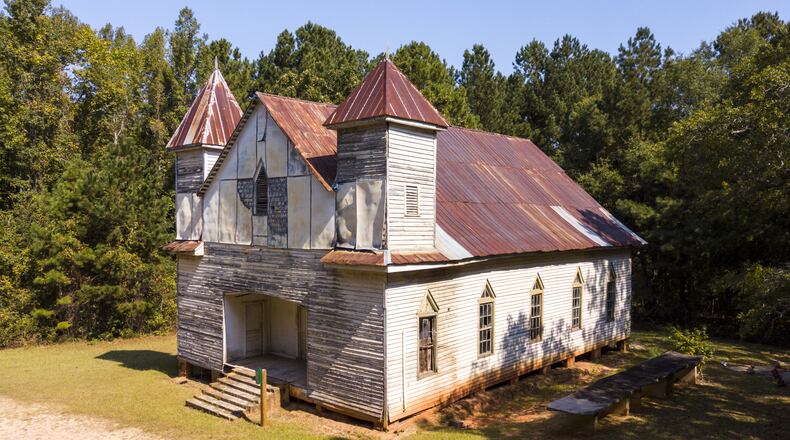A mental hospital, a 200-year-old tenant farm, a mid-century elementary school, an 1899 Baptist church, all tell of Georgia’s history and all could disappear.
The Georgia Trust for Historic Preservation named these sites to the Top 10 Places in Peril, a list it publishes each year to bring attention to the jeopardy facing the state’s architectural, archaeological and cultural heritage.
The list includes buildings on the 2,000-acre campus of the infamous Central State Hospital in Milledgeville.
At one time the largest mental hospital in the country, the facility included nearly 200 buildings. The complex was fully closed in 2013.
Credit: Halston Pitman
Credit: Halston Pitman
One 1920s-era building on the defunct mental hospital/prison campus is already being retro-fitted for a computer services company, said Mark C. McDonald, CEO of the Georgia Trust. Another building is being eyed as a possible nursing school for nearby Georgia College, he said.
But others are unoccupied, and are succumbing to kudzu and weather, or have already been bulldozed. The Trust is working with the Central State Hospital Redevelopment Authority to find appropriate uses for the structures, but “a number of them might not survive,” said McDonald.
Another building on the list, Cary Reynolds Elementary School, built in 1961, is one of the earliest projects by Atlanta architect John Portman. Portman went on to remake downtown Atlanta in his own image, designing the Hyatt Regency, the Westin Peachtree Plaza, Peachtree Center and many other landmarks.
The Doraville structure is still in use as a part of the DeKalb County School system, but it needs new roofing, windows and other repairs, McDonald said.
“School boards will frequently abandon buildings and build new ones because they can do it cheaper than rehabilitating the old ones,” he said. “We are concerned if improvements don’t take place, that could happen here.”
Here are the Top 10 endangered places in Georgia:
Antioch Baptist Church, Crawfordville:
Constructed in 1899 by local craftsmen, the structure no longer hosts regular services.
Asbury United Methodist Church, Savannah:
This 1887 building is the only African American United Methodist church in Savannah’s historic Victorian District. The congregation is working to raise enough money to be able to restore the building to full use.
Cary Reynolds Elementary School, Doraville:
This 1961 structure “remains in need of significant investments to improve the performance of the building and the quality of life for its students and faculty” according to the Georgia Trust.
Central State Hospital, Milledgeville:
The buildings on the hospital’s 2,000 acres date from 1842 to the mid-20th century. The campus was previously on Places in Peril in 2010, and its deterioration has continued since its closure in 2013.
Fountain Hall, Atlanta:
Originally called Stone Hall, the building was constructed in 1882 and is one of the most prominent structures on the original campus of Atlanta University. It has been boarded up since 2003 and is the victim of weather and vandals.
Heritage Park, Griffin:
This community space includes a gymnasium, a community garden, and a Rosenwald school, built in 1929 by Booker T. Washington and Sears magnate Julius Rosenwald.
John Nelson Deming home, Valdosta:
Valdosta’s notable carpenter John Deming built ornate houses from the 1890s through the 1920s, including his own home. In 2006 his home was rezoned for commercial development and bought by an investment group, but still stands empty.
Masonic Lodge #238, Dalton:
This is the most damaged of the places in peril, said McDonald: The roof and the second floor have begun collapsing into the first floor. It is also a solid example of a structure from Dalton’s once-thriving commercial district built and patronized by African Americans.
Nolan Crossroads, Bostwick:
This tenant farm complex in Morgan County operated for more than 100 years, beginning in 1815. Still surviving is a dining hall, a mule barn and farmhouses, all in states of disrepair.
Rose Hill School, Porterdale:
Bibb Manufacturing was once the largest textile company in the country. The segregated living facilities for millworkers included this school for African Americans. The “historic school building increasingly bears the scars of decades of neglect.”
About the Author
Keep Reading
The Latest
Featured







